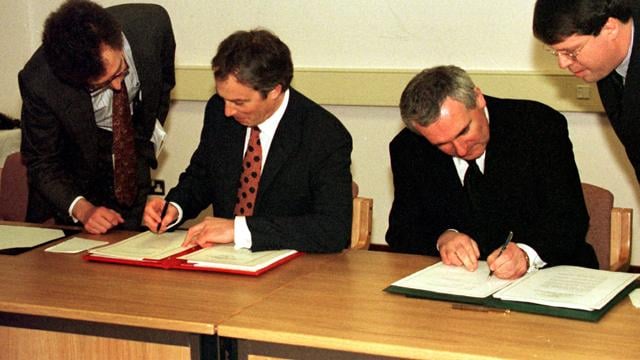Northern Ireland ” has an opportunity to lead the way in building a genuine culture of tolerance after violence”. Will it fulfil that hope?
Published in partnership with the Social Science Birmingham Forum:
On April 10, former negotiators gathered to celebrate the 20th anniversary of the Good Friday Agreement. The accord ended three decades of Northern Ireland’s “Troubles”, with more than 3,500 people killed and 50,000 injured. Its signature is estimated to have saved up to 2,400 lives in the past two decades.
The celebrations mark these achievemets. But they are also an apt reminder that the Agreement’s troubled youth is far from over, that peace cannot be taken for granted, and that many promises have yet to be fulfilled.
Stability and Security
Northern Ireland’s stability and security over the past 20 years has been underpinned by the consensus over the sharing of political power between both Irish nationalists, mainly Catholic, and British unionists, mainly Protestant. However, The “Cash for Ash” scandal over funding for a renewable energy scheme has frozen the Northern Ireland Government for 15 months. First Minister Arlene Foster of the Democratic Unionist Party has been implicated. Deputy First Minister Martin McGuinness of Sinn Fein resigned and the party refused to replace him. Stormont remains at an impasse.
While negotiations continue for the restoration of the Government, the economy is bearing the costs of instability. An emergency budget was passed in November to ensure the continuation of public services, but important decisions such as expansion of Shared Education programmes remain in limbo.
This situation is risky: past experience suggests that post-conflict societies like Northern Ireland are vulnerable to socio-economic pressures and political voids. Indeed, since the collapse of the power-sharing executive, new issues have emerged to complicate negotiations.
Uncertain Strategic Environment
Much has been written about the detrimental impact on Northern Ireland of the Brexit referendum for the UK’s departure from the European Union.
Brexit challenges one of the pillars of the Good Friday Agreement: an open Irish border. Suggestions that the UK can unilaterally change this status are serious enough to trigger demand for a referendum on Irish unity. The results of such a referendum are unclear: demographic change is narrowing the divide between the Protestant and Catholic communities and has already resulted in an overall Nationalist majority in the Assembly.
Culture, Identity, and the Past
The Good Friday Agreement envisaged the promotion of a culture of tolerance, premised on a parity of esteem for the Catholic/Irish and Protestant/British traditions. However, debates over the use of the past, the display of symbols, and cultural expressions have recently poisoned public discussion. Several rounds of political negotiations and a commission on Flags, Identity, Culture, and Tradition have failed to generate broad agreements on how to regulate these identity-sensitive issues.
Divisions over an Irish-language Act have emerged as the primary frontline between Sinn Fein and the DUP. Sinn Fein reiterates that the legislation, granting equal official status between Irish and English, is mandated by the 2006 St Andrews Agreement, the successor to the Good Friday Agreement. First Minister and DUP leader Foster is firmly opposed, “If you feed a crocodile it will come back for more.”
Culture and Peace
The impasse in Stormont is a stark warning to peace negotiators everywhere — for resilient and transformative peace processes, provisions to address identity-sensitive cultural expressions should be built into comprehensive peace agreements and implemented resolutely in their aftermath.
I am currently investigating cultural reforms in 292 peace agreements concluded between 1989 and 2016, and looking at their implementation in four cases: Northern Ireland, Lebanon, the Former Yugoslav Republic of Macedonia, and Sierra Leone.
My finding? Northern Ireland is not alone in marginalizing cultural expressions in the immediate aftermath of a peace agreement. But at this historical junction, it has an opportunity to lead the way in building a genuine culture of tolerance after violence.

